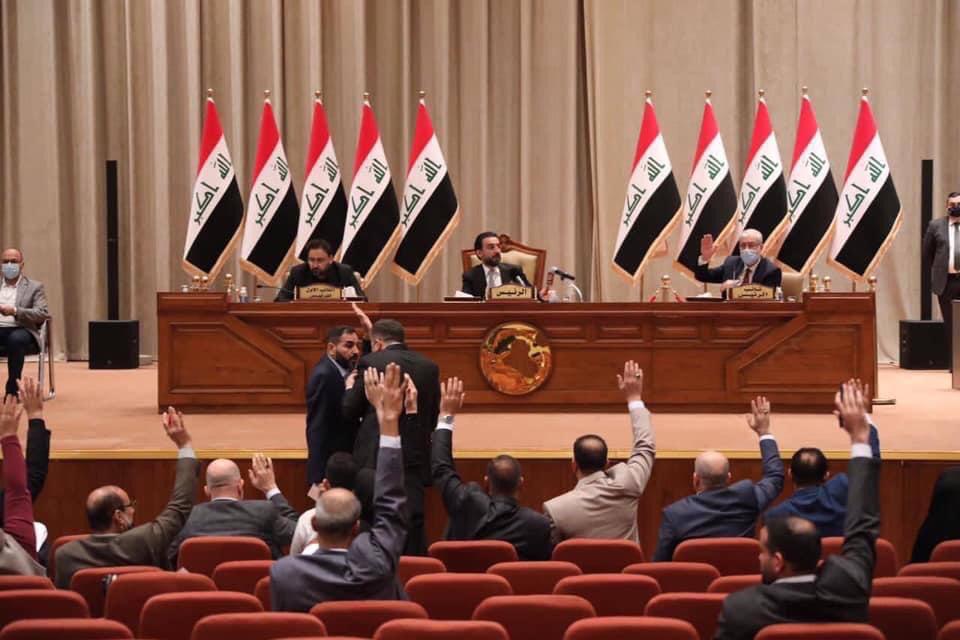Mohammad Baqer Sedaghat, speaking in an interview with the website of the Strategic Council on Foreign Relations, referred to the political developments in Iraq and said that the change in the election law caused changes in the process of early parliamentary elections and its results, adding: During this period, independent candidates were able to both run for the elections and win it, as a result of which 43 independents entered the parliament.
He cited the high inefficiency of the ruling parties as another reason for the people’s distance from them and the decline of their votes, and said: However, as in the previous period, no group or party was able to win half plus one of the parliamentary seats; although Sadr’s group won the most seats.
The researcher of the Mersad Institute referred to the consultations between the political groups to form the majority faction and added: The Sadr faction now sees its interests in the coalition with the newly formed Al-Siyada Coalition led by al-Halbousi and Khamis Al-Khanjar and, on the other hand, al-Halbousi considers the continuation of his presidency in the parliament to be in line with Sadr’s current. The Kurdistan Democratic Party (KDP) also decided to choose an independent candidate for the presidency during this period and to win the elections in alliance with other victorious currents, including al-Halbousi, Khamis al-Khanjar, and the Sadr faction. That is why we are witnessing the presence of Hoshyar Zebari.
Sedaghat continued: Now we are witnessing a three-party coalition, on one side of which is the victorious coalition of Khamis al-Khanjar and al-Halbousi, and on the other two sides is the Sadr faction and the Democratic Party of Iraqi Kurdistan. The Democratic Party wants the presidency, the Sunni current seeks the presidency of the parliament and Muqtada al-Sadr also seeks to oust the former parties and play the maximum role in this period of the new Iraqi government.
Saying that the Shiite currents coordination committee has not been successful in its meetings with other parties so far, and in the new era, they seem to become a group critical of the government, he said: Naturally, the delay in forming a government in Iraq has devastating consequences, but it seems that we are gradually approaching the formation of a new government in Iraq, given the end of the consultations. In the coming days, the majority faction will be announced by the Iraqi Supreme Court, after which Iraq will enter the process of appointing a president and a prime minister.
The expert on Iraq affairs continued: Unlike previous periods, in this period, the critical current of the government will announce its protests through legal mechanisms and not in the form of street protests, which ensures that political steps in Iraq will not be delayed or faced with raucous and street protests.
Regarding the orientation of the future government in Iraq and the tendency of the winning groups to consult with all political currents, Sedaghat said: Analysts close to the government of Mustafa al-Kadhimi have also acknowledged that his government was in fact the government of Sadr’s current; therefore, the government that is to be formed in the future will be in line with the Al-Kadhimi’s government in terms of internal issues and the fight against resistance groups, as well as regional issues and relations with Iran and more inclination towards Arab countries.
Commenting on the future government’s approach regarding the implementation of the resolution on the withdrawal of US troops from Iraq, he said: Muqtada al-Sadr opposes US presence in Iraq, but it is unclear where this will go in practice.
The researcher of the Mersad Institute also explained about the possibility of political consensus in Iraq, saying: In previous periods, the currents that won the elections, such as groups affiliated with the al-Dawa Party or the al-Hashd al-Shaabi, had ideological backgrounds and theoretical foundations that, in terms of creating harmony, provided a more comfortable space for interaction, and their boundaries were clear. In this period, the victorious groups do not have fixed theoretical and ideological foundations and the only factor of consensus between them is their common interests.
He noted: Common interests have different definitions under different situations, so it is not possible to imagine a clear vision for the ongoing consensus among the winning groups in the elections, and changing circumstances in the future can change the consensus created among them; as in the past during Sadr current in 2008, when the government of Nouri al-Maliki decided to deal with armed groups outside the law, there were widespread conflicts with the government, and the problems between them today are rooted in that issue; but two years later, in 2010, under a single coalition they participated in the elections and formed the government, although Muqtada al-Sadr later left the coalition.
He continued: Muqtada al-Sadr in 2018 referred to Khamis al-Khanjar as “the dagger of treason”, but in the tweets he now publishes, he describes him as a “partner of the homeland”; therefore, the consensus that is formed between those groups is not stable and strategic and may change depending on the situation. Given this nature, in the shadow of the existing parties, it seems unlikely that we will see peace and stability in the medium term among the dominant political groups in Iraq.
He added: This feature is also very important for external actors in Iraq; because they know that the other side is taking populist positions based solely on their interests, therefore they cannot design long-term and strategic interests with them.
Regarding Iran’s neighborly relations with the new Iraqi government, he added: Obviously, it should be based on bilateral common interests, the relations between the two countries and should be redefined and regulated by relying more on the commercial-economic dimension.










0 Comments